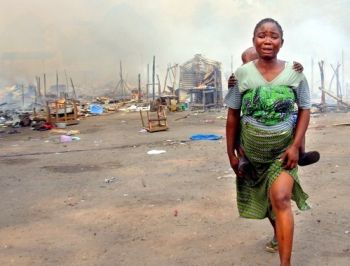
Publisher:
Bonnie King
CONTACT:
Newsroom@Salem-news.com
Advertising:
Adsales@Salem-news.com

~Truth~
~Justice~
~Peace~
TJP
Sep-21-2010 11:31

 TweetFollow @OregonNews
TweetFollow @OregonNews
Protection of Civilians and IDP's Must Take Priority in DRC
Alysha Atma Salem-News.com African Affairs CorrespondentAn example of this was seen last month when over 200 women were gang raped within 20 miles of a UN stronghold.
 Scene from the DRC courtesy: Intercontinental Cry |
(PORTLAND, Ore.) - Human Rights Watch (HRW) is calling on the government of the Democratic Republic of Congo (DRC) and the United Nations (UN) peacekeeping mission to provide greater emphasis to the protection of the nearly two million people displaced in the conflict-ridden eastern part of the country, the fourth-largest internal displacement in the world.
Last week HRW released an 88-page report1, documenting the effects of the myriad of armed groups and Congolese armed forces have had on the hundreds of thousands of displaced. Combatants have forced civilians from their homes and lands, looted their properties, and punished them for suspected collaboration with enemy groups. These internally displaced persons (IDPs) have fled killings, rape, burning, pillaging, and forced labor, often multiple times and for many years.
“Despite the government’s stabilization and reconstruction efforts in eastern Congo, the population remains at risk from continuing violence,” said Gerry Simpson, senior refugee researcher at Human Rights Watch and author of the report. “The internally displaced are among the most vulnerable people in the region, and they desperately need greater protection and assistance.”
Although military operations have continued throughout this year, Congolese government officials have repeatedly said that the security situation in eastern Congo has vastly improved and want to see the displaced return home.
The report documents police and bandit raids on the camps and forced repatriation - September 2009 Congolese authorities pressured 60,000 people in UN-run camps in and around Goma to return home; attacking those who were slow to pack up and leave.
“UN agencies and donors need to provide sufficient resources for emergency humanitarian assistance,” Simpson said. “The displaced should be encouraged to return home only if it is safe and under voluntary and dignified conditions.”
The report describes the obstacles displaced people face in returning to their homes: the general lack of security in villages away from main roads; abuses and threats by combatants on all sides of the conflict; accusations of collaborating with enemy groups; looting of harvests; extortion by ill-disciplined combatants; and disputes over land title, land occupation, and property destruction. These displaced people face economic hardship, hunger, and disease, and the vast majority have little or no access to health care and education.
“Again and again, parents desperate to feed their children said that the absence of aid meant that they had no choice but to risk life and limb and return to places of grave danger,” Simpson said. “They need aid both to fend off hunger and to avoid losing their lives at the hands of armed groups.”
Congolese authorities and UN peacekeepers have a poor track record in protecting the civilians and displaced. Spread across a vast and difficult terrain with overstretched resources, the almost 20,000 peacekeepers ability to protect has been limited.
An example of this was seen last month when over 200 women were gang raped within 20 miles of a UN stronghold. (see: salem-news.com/articles/august312010/congo-rape-aa.php) As a result, the challenge of protecting eastern Congo’s civilians remains immense and should be priority.
“The rebuilding of eastern Congo should not come at the expense of protection for its most vulnerable citizens,” Simpson said. “The UN and donors should ensure that their rights to life and dignity remain central to any reconstruction efforts.”
*1Always on the Run: The Vicious Cycle of Displacement in Eastern Congo hrw.org/node/92772
*Source: Human Rights Watch
 Alysha Atma spends many hours working on projects that support and benefit the beleaguered people of African nations who spend way too much time off the western media's radar. This writer explains that she is a culmination of all her experiences, most importantly knowledge she says, and all that she still needs to learn; lessons of love, laughter and the extraordinary giving of both young and old. She says she has the enormous fortune of learning from the best; every person around her, and the amazing strength and fortitude of those she has never met but will always strive to listen to. "I continue to work and write because I believe in the power of community and the power of one, both contradictory to each other and yet can move together in a very powerful way. I feel a responsibility to use my place, freedoms and connections here in the US to stand up and yell for those who need my voice and actions. I have seen such strength in my fellow humans that I cannot even begin to comprehend, they have traveled distances, have gone without food, water, shelter and safety for days and weeks at a time. I have a responsibility as a fellow human to put our common humanity before anything else. Everyone deserves to look towards tomorrow, to dream of a safe future and to have a peaceful present." You can write to Alysha Atma at: alysha.atma@gmail.com
Alysha Atma spends many hours working on projects that support and benefit the beleaguered people of African nations who spend way too much time off the western media's radar. This writer explains that she is a culmination of all her experiences, most importantly knowledge she says, and all that she still needs to learn; lessons of love, laughter and the extraordinary giving of both young and old. She says she has the enormous fortune of learning from the best; every person around her, and the amazing strength and fortitude of those she has never met but will always strive to listen to. "I continue to work and write because I believe in the power of community and the power of one, both contradictory to each other and yet can move together in a very powerful way. I feel a responsibility to use my place, freedoms and connections here in the US to stand up and yell for those who need my voice and actions. I have seen such strength in my fellow humans that I cannot even begin to comprehend, they have traveled distances, have gone without food, water, shelter and safety for days and weeks at a time. I have a responsibility as a fellow human to put our common humanity before anything else. Everyone deserves to look towards tomorrow, to dream of a safe future and to have a peaceful present." You can write to Alysha Atma at: alysha.atma@gmail.com
Articles for September 20, 2010 | Articles for September 21, 2010 | Articles for September 22, 2010

Quick Links
DINING
Willamette UniversityGoudy Commons Cafe
Dine on the Queen
Willamette Queen Sternwheeler
MUST SEE SALEM
Oregon Capitol ToursCapitol History Gateway
Willamette River Ride
Willamette Queen Sternwheeler
Historic Home Tours:
Deepwood Museum
The Bush House
Gaiety Hollow Garden
AUCTIONS - APPRAISALS
Auction Masters & AppraisalsCONSTRUCTION SERVICES
Roofing and ContractingSheridan, Ore.
ONLINE SHOPPING
Special Occasion DressesAdvertise with Salem-News
Contact:AdSales@Salem-News.com

Salem-News.com:
googlec507860f6901db00.html

Terms of Service | Privacy Policy
All comments and messages are approved by people and self promotional links or unacceptable comments are denied.
[Return to Top]
©2025 Salem-News.com. All opinions expressed in this article are those of the author and do not necessarily reflect those of Salem-News.com.